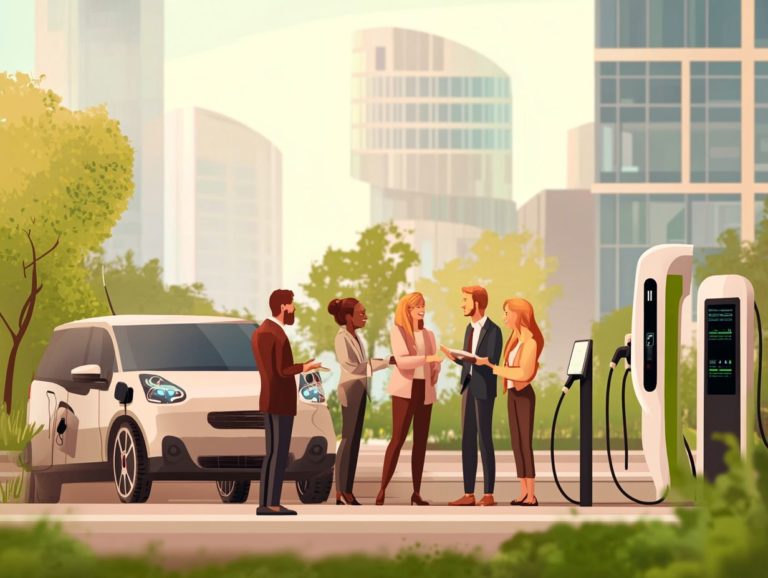understanding tax deductions for ev purchases
Navigating tax deductions for electric vehicle (EV) purchases can feel overwhelming, but understanding the basics can unlock significant savings for you.
This article explains tax deductions, explores various federal, state, and local incentives, and outlines the eligibility requirements you need to know.
It also walks you through the steps to claim these deductions and offers valuable tips on maximizing your savings.
Key considerations are highlighted to keep in mind as you embark on your eco-friendly investment.
Dive in to discover how to make your EV purchase more affordable!
Contents
Key Takeaways:

Understand the basics of tax deductions and how they can benefit you when purchasing an electric vehicle.
Familiarize yourself with the different types of tax deductions available, including federal tax credits and state/local incentives.
Ensure you meet the eligibility requirements and follow the necessary steps to claim tax deductions for your EV purchase.
Maximize your tax deductions by researching available incentives and keeping track of necessary paperwork.
Be aware of additional factors, such as potential changes in tax laws and expiration dates of tax credits, when planning for EV tax deductions.
The Basics of Tax Deductions for EV Purchases
Understanding what you need to know about EV tax policy for electric vehicle (EV) purchases is crucial for anyone eager to save money while helping the environment.
The Inflation Reduction Act has introduced substantial tax credits to promote clean vehicle adoption, covering both electric and fuel cell options.
These federal tax credits apply not only to new EV purchases but also to pre-owned vehicles and commercial clean vehicles.
It’s essential to be informed about the opportunities available to you and the IRS registration requirements that accompany them.
What are Tax Deductions?
Tax deductions help you lower your taxable income, reducing your overall tax bill. By designating certain expenses as deductible, you can decrease your taxable income.
Common examples include deductions for:
- Mortgage interest
- Student loan interest
- Medical expenses
These deductions can lead to significant savings by lowering your taxable income, allowing you to keep more of your hard-earned money throughout the year.
Your eligibility for these deductions depends on IRS regulations, which often require specific documentation and calculations for compliance.
Knowing these rules is important for maximizing your potential savings and may grant you access to federal tax credits that further reduce your tax burden.
Types of Tax Deductions for EV Purchases
There are various tax deductions available for electric vehicle (EV) purchases, and understanding what you need to know about EV purchase rebates presents an excellent opportunity to save money while choosing eco-friendly transportation options.
Federal Tax Credits
Federal tax credits for electric vehicles are essential incentives that encourage you to switch to clean vehicles, providing significant savings based on IRS rules.
Notably, the Clean Vehicle Tax Credit offers a considerable financial boost for those making eco-friendly choices. The Inflation Reduction Act enhances these incentives, expanding the range of qualifying models, which can amount to thousands of dollars off the purchase price.
To determine vehicle eligibility, factors such as manufacturer production limits and battery capacity are crucial, as specified by the IRS. With these credits, you can gain significant financial relief, making the shift to cleaner transportation more affordable and appealing.
If you’re considering an EV, explore available tax incentives and consult with a tax professional for personalized advice!
State and Local Incentives

You ll find a wealth of state and local money-saving options designed to enhance your savings on electric vehicle (EV) purchases. These incentives can significantly lower your overall cost of owning an EV and vary widely based on your location.
Some states offer rebates at the point of sale for immediate savings. Many local governments are investing in EV charging infrastructure, including public charging stations and incentives for home charger installations.
Some municipalities provide tax breaks, reduced registration fees, or exclusive access to carpool lanes. These are aimed at encouraging more people to adopt clean vehicles.
Explore these local programs to discover amazing opportunities to save money while contributing to a sustainable future.
Eligibility for Tax Deductions
Understanding the eligibility for tax deductions is essential to fully leverage the tax incentives for electric vehicle (EV) purchases. Knowing these details helps maximize your financial benefits and aids in making informed decisions.
Requirements and Qualifications
To qualify for tax deductions on electric vehicles, you must meet specific requirements set by the Internal Revenue Service (IRS). This includes factors like the vehicle’s weight, which typically needs to exceed 6,000 pounds for certain deductions, and battery capacity must meet minimum thresholds.
Understanding these criteria helps you navigate EV financing options more effectively. Knowing the critical thresholds and guidelines makes the process less overwhelming.
How to Claim Tax Deductions for EV Purchases
Claiming tax deductions for electric vehicle (EV) purchases involves a series of essential steps. Following these steps allows you to take full advantage of the available tax incentives.
Steps to Claiming Tax Deductions
- Ensure your vehicle meets eligibility requirements and have the purchase date and price handy.
- Organize documentation like the bill of sale and proof of registration both are essential.
- Familiarize yourself with IRS guidelines regarding qualifications for tax credits; this significantly influences your claim’s outcome.
Review the IRS checklist carefully to uncover any overlooked deductions. Seek guidance from tax professionals to gain practical tips for maximizing your returns and avoiding potential pitfalls.
Maximizing Tax Deductions for EV Purchases

To maximize tax deductions for your electric vehicle (EV) purchases, engage in strategic planning. Familiarize yourself with the various credits and incentives available.
Tips for Maximizing Savings
Explore various tips and strategies to maximize your savings when purchasing electric vehicles. Understand the financial incentives at both federal and state levels, and look for dealership portals offering exclusive discounts and financing options.
By monitoring different EV models and their associated incentives, you can significantly lower your total cost of ownership. Conduct thorough research to find electric vehicles that align best with your budget and needs, ensuring the best financial value while meeting your environmental goals.
Other Important Considerations
When you contemplate purchasing an electric vehicle (EV), it s essential to weigh several key factors that can significantly impact both your finances and practical usage.
Additional Factors to Keep in Mind
When considering the purchase of an electric vehicle, various key factors can influence your decision. These include financing options, federal incentives, and the vehicle’s history.
For example, financing options can significantly impact your experience. Various lenders offer specialized rates or loans specifically designed for EV buyers, often featuring longer repayment terms that could ease your financial planning.
Don’t skip the EV history report! This report shows details about the car’s past, like who owned it before, how well the battery is performing, and if it has been in any accidents. It provides valuable insights into the vehicle’s reliability.
The vehicle assembly process varies by manufacturer, affecting quality and longevity. These elements combine to shape your choices, guiding you toward vehicles that not only fulfill your requirements but also provide peace of mind about your investment.
Frequently Asked Questions
What is an EV?

An EV, or electric vehicle, is a type of vehicle that is powered by electricity instead of gasoline or diesel. It uses an electric motor and rechargeable batteries to run.
What are tax deductions for EV purchases?
Tax deductions for EV purchases are a way for individuals and businesses to reduce the amount of taxes they owe for purchasing an electric vehicle. These deductions can include a federal tax credit, state tax credits, and other incentives.
How do I qualify for tax deductions for EV purchases?
To qualify for tax deductions for EV purchases, you must have purchased or leased an electric vehicle that meets the requirements set by the government. Research the criteria to ensure you qualify for each deduction or incentive.
What is the federal tax credit for EV purchases?
The federal tax credit for EV purchases is a credit that can be applied to your federal income tax return. The amount of the credit depends on the type of electric vehicle you purchased and the size of its battery. It can range from $2,500 to $7,500.
Can I claim multiple tax deductions for EV purchases?
Yes, you can claim multiple tax deductions for EV purchases as long as you meet the qualifications for each one. For example, you can claim both the federal tax credit and a state tax credit, if your state offers one. However, you cannot claim the same deduction twice.
Do all states offer tax deductions for EV purchases?
No, not all states offer tax deductions for EV purchases. However, many states do offer some form of incentives, such as tax credits, rebates, or exemptions. It is important to research and understand the specific incentives offered by your state.






